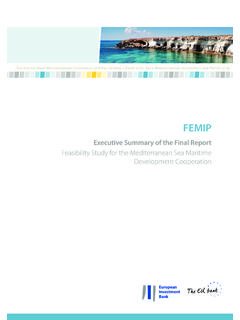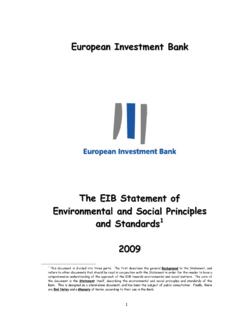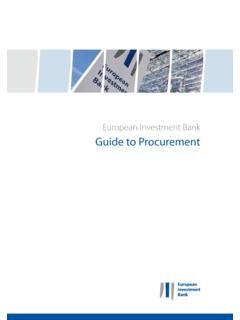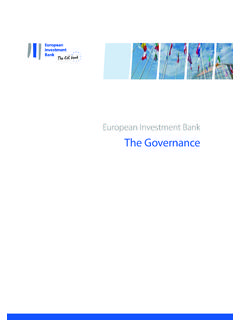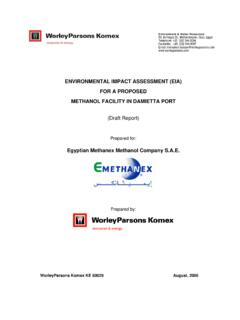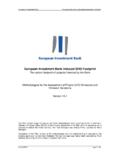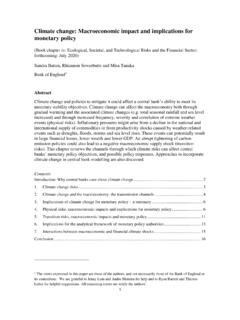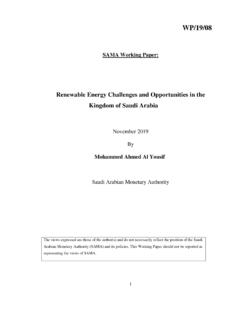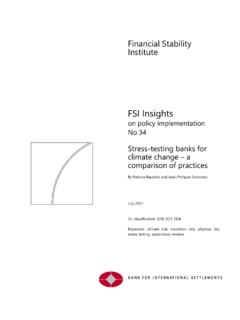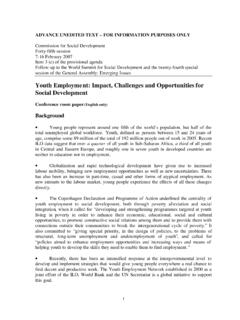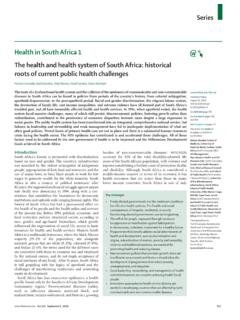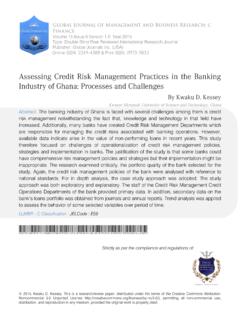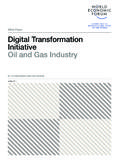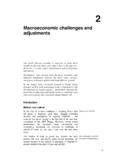Transcription of Banking in sub-Saharan Africa - European Investment Bank
1 Banking in sub-Saharan AfricaChallenges and Opportunities Banking in sub-Saharan Africa Challenges and Opportunities January 2013 Lead authors Montfort Mlachila, Deputy Division Chief, International Monetary Fund Dennis Dykes, Chief Economist, Nedbank Sabina Zajc, Economist, European Investment Bank Paul-Harry Aithnard, Group Head of Research, Ecobank Thorsten Beck, Professor of Economics, Tilburg University Mthuli Ncube, Chief Economist and Vice-President, African Development Bank Oskar Nelvin, Economist, European Investment Bank Editors Pedro de Lima, Head of Division, European Investment Bank Sabina Zajc, Economist, European Investment Bank Anna Schumacher, Senior Assistant, European Investment Bank Robert Schmitz, Statistical and Reporting Analyst, European Investment Bank The articles in this document were discussed at a roundtable event hosted by the EIB s Economics Department in Luxembourg on January 23rd, 2013.
2 About the Economics Department of the EIB The mission of the EIB Economics Department is to provide economic analyses and studies to support the Bank in its operations and in its positioning, strategy and policy. The Department, a team of 25 economists and assistants, is headed by Debora Revoltella, Director of Economics. Disclaimer The views expressed in this document are those of the authors and do not necessarily reflect the position of the EIB. Banking in sub-Saharan Africa Challenges and Opportunities European Investment Bank, January 2013 PREFACE sub-Saharan Africa is a continent with significant problems on the one hand and great potential on the other.
3 Its past has been difficult and formidable challenges to further development remain. Poverty is pervasive, human development is low, and growth has not been inclusive. The region faces an enormous infrastructure gap, while the Investment climate and regulatory environment are relatively poor. There are still weaknesses in governance and institutional capacity. However, significant differences exist among individual countries, and those that have seized the opportunity and implemented far-reaching reforms are now harvesting better results. Thanks to the reformist economies, transition and progress on the continent is real and well established.
4 Over the last ten years, real economic growth in the region has averaged 5 to 7 percent per year, consistently above the world average. Some of the fastest-growing countries in the world have been from sub-Saharan Africa . Last year, five sub-Saharan African countries outgrew China and 22 outgrew India. Commodities, while important for the region, have not been the only source of sustained growth: working-age population is growing, urbanization is rising, technological advances are emerging in many layers of the economy, labour productivity has increased, Investment has outpaced aid with increased interest in the region, while macroeconomic and structural policy implementation and institutional capacity have improved.
5 Sustained growth in sub-Saharan Africa has led in part to financial deepening, while financial sector development has also played a significant supporting role in the growth process. Yet, sub-Saharan African financial and Banking systems remain underdeveloped. The Banking systems in the region are highly concentrated and generally inefficient at financial intermediation; they are characterized by their small size and low intermediation, and despite little barriers to entry and exit - as evidenced by the dominant market share of foreign banks - competition is still limited. In this context, access to finance in sub-Saharan Africa is among the lowest in the world and presents one of the key obstacles to the activity and growth of enterprises.
6 This in turn constrains the region from achieving its full growth potential. However, the relatively stable macroeconomic and financial environment, together with the current reform momentum and expected strong economic growth in many countries in the region, bode well for further development of the Banking system. Moreover, the on-going structural changes in the Banking sector, such as the emergence of mobile and agency Banking as well as Pan-African Banking groups, have a great potential to transform the existing business models, improve competition and efficiency, as well as access to finance and financial inclusion. This study was prepared for the EIB s Roundtable Discussion on Banking in sub-Saharan Africa .
7 It was put together by the EIB s Economics Department to support the Bank s new initiatives in the region s Banking sector and to contribute to a better understanding of the recent market developments in the sector. The study was a collaborative effort with contributions from several key players active in the region, namely international financial institutions, some of the leading banks and academic researchers. It provides an overview of the recent developments and trends in the sub-Saharan Banking sector, as well as the challenges and opportunities that lie ahead. As such, it is a key starting point for understanding future actions needed to improve financial deepening in sub-Saharan Africa .
8 Pim van Ballekom EIB s Vice President responsible for sub-Saharan Africa Banking in sub-Saharan Africa Challenges and Opportunities European Investment Bank, January 2013 CONTENTS Introduction .. 5 SABINA ZAJC Banking in sub-Saharan Africa : the Macroeconomic Context .. 7 MONTFORT MLACHILA, SEOK GIL PARK, MASAFUMI YABARA Banking in Southern Africa .. 29 DENNIS DYKES Banking in East African Community .. 43 SABINA ZAJC Banking in Central and West Africa : A Growth Story .. 55 PAUL-HARRY AITHNARD, GEORGE BODO, SULEMANA MOHAMMED, SUSAN ZINDOGO SMEs Finance in Africa : Challenges and Opportunities .. 75 THORSTEN BECK Accessing Local Markets for Infrastructure .. 87 MTHULI NCUBE The EIB in sub-Saharan Africa .
9 109 OSKAR NELVIN Banking in sub-Saharan Africa Challenges and Opportunities European Investment Bank, January 2013 5 Introduction SABINA ZAJC sub-Saharan Africa has been on a sustained growth path for the last two decades. This trend represents a significant change compared to previous years. The positive developments could be attributed to many factors, most notably to continuous reforms and improved policies, debt relief, vast natural resources, and increased Investment . Thus, the resilience of sub-Saharan African economies has increased, as witnessed by a modest impact of the recent global economic crisis on the region. However, the preconditions for social and economic development vary significantly among the countries, and this has contributed to the uneven pace of growth across the continent.
10 Since the 1990s, financial sector reforms in many sub-Saharan African countries have contributed significantly to the development and efficiency of their financial - and particularly Banking systems. Consequently, commercial banks capital bases have strengthened and their risk management practices have improved; credit to the private sector has risen, albeit from a low base; and most of the sub-Saharan African Banking systems have proved resilient to the recent events of global financial stress. At the same time, there is potential for a significant change in the landscape for Banking in many sub-Saharan African countries, such as the expansion of mobile Banking and regional Banking groups.
